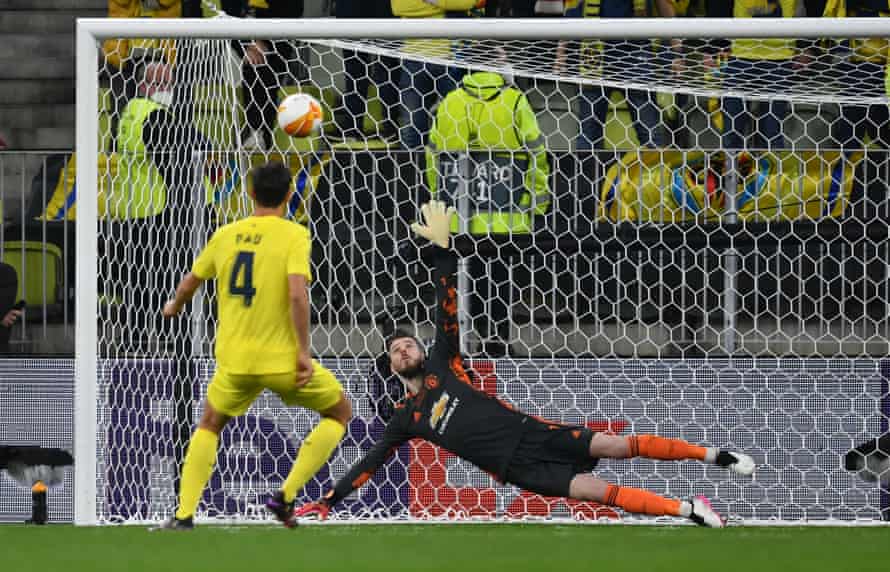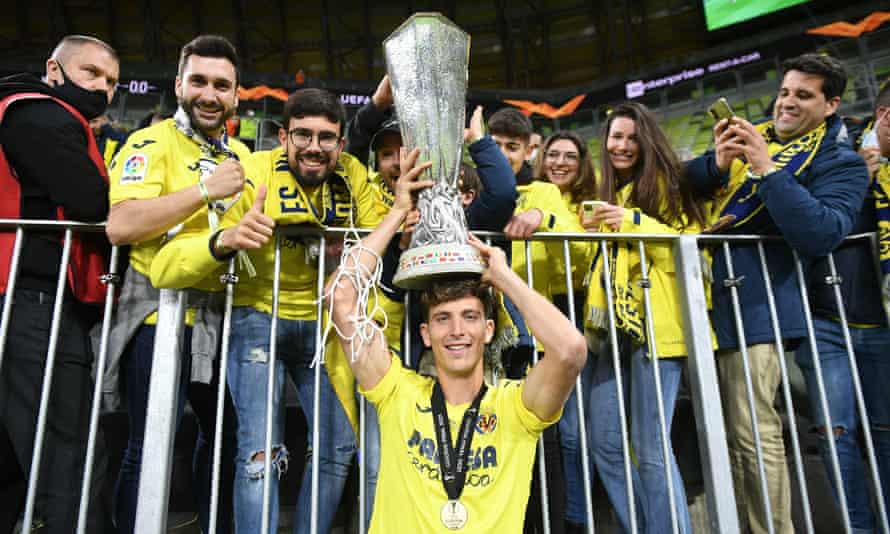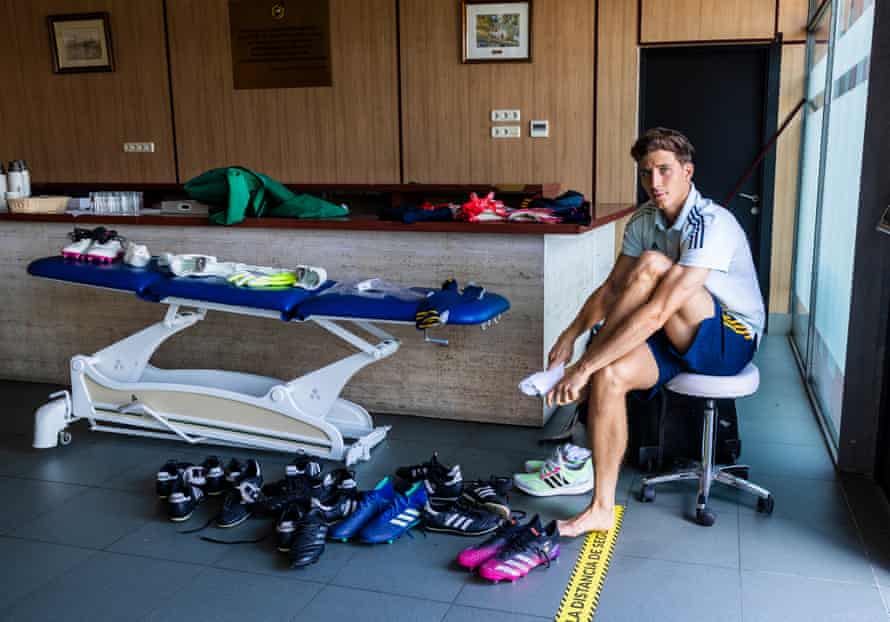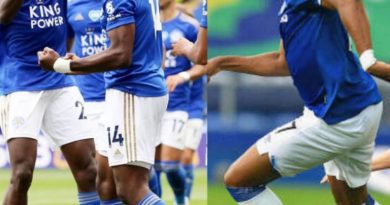Villarreal’s Pau Torres: ‘It’s not normal that a club from such a small town does so well’ | Villarreal
The entire town watched as history was made, except Pau Torres, who was making it. It was late on 26 May and Vila-real, population 51,293, was about to become the smallest place to have a football team win a European trophy. Villarreal faced Manchester United, the club with a stadium that could fit them all in and still add 22,847 more, and the biggest game in their history had gone to penalties. Thirteen long, tense minutes later, it was still there. Every Villarreal outfield player had scored from the spot, except one of them.
In the final minutes before the Europa League final the Villarreal manager, Unai Emery, told his team to do it for “Pau’s town”. Aged eight, Torres had cried in the stands when Juan Román Riquelme’s missed penalty denied them a first final. Fifteen years later, having at last reached one, it was on him. Of all the scenarios that had run through his mind since he first attended El Madrigal aged three and joined the club at six, this wasn’t one. Not even when they reached the shootout.
“You think five penalties will do it but you watch and no one misses, no one misses, no one misses. The sixth comes, the seventh, the eighth…” he says. “After the first five, it’s one at a time. If someone’s more confident, he goes. We were looking at each other, thinking: ‘bloody hell, it might reach us.’ The three left at the end were those with maybe the most doubts. Mario, the captain, said: ‘don’t worry, I’ll take it [the ninth]’.” Mario Gaspar scored, but so did United’s Axel Tuanzebe. It was seven minutes to midnight. His town, his time.
Only 2,100 had been able to travel and if there were more back home it wasn’t that many more. Some people might have grown tired of all the talk of how small the place is by now, but Torres isn’t one of them, which is lucky. “I like it,” he says. “However much the club grows, this is still a town of 50,000. It’s not normal that a club from such a small place does so well. I’m the only one in the team from Vila-real and there were lots of people in the stands I knew. I’m delighted to represent the town. I’ve always lived there – I’m comfortable there, feel myself there – and we all know each other. If it’s not a friend, it’s a friend of my cousins. I couldn’t let them down.”
He didn’t. “One thing I was sure about was where I was putting it,” he says, and that meant smashing an unstoppable shot into the top corner that belied the nerves. “A relief,” he calls it, “a huge weight lifted” which left just the goalkeeper, Gerónimo Rulli. Rulli scored one and saved another, Villarreal were the Europa League champions. “It was so important – a first title and against Manchester United to boot. Afterwards when we were celebrating, you go up to the stand and it’s: ah look, there’s so-and-so, there’s so-and-so … that’s very special.”

All of which helps to explain why, as Villarreal prepare to face Manchester United again, Pau Torres is even still here. If he had been from anywhere else, he would be somewhere else. If he hadn’t scored, he probably would be too.
Trophy secured, and along with it Champions League football, Torres joined the national team at the Euros. Then he immediately went to the Olympics, but he returned from Tokyo early and chose not to take his statutory break in order to play the European Super Cup against Chelsea. “Another final, another step in our growth and a moment to enjoy – we’d won the important title,” he says. The “our” is well-chosen.
Having joined Villarreal at six, Torres has developed into the outstanding Spanish defender of his generation, despite breaking his leg playing against West Brom at a tournament in Coventry at 15. Quiet, polite, almost gentle and universally liked at the club, he is an elegant central defender who admires and analyses Virgil van Dijk, describing him as “the best in the world”: “the way he handles being outnumbered in particular is something to learn from”.
He is also the man who has “everything”, according to Luis Enrique. “I like his personality, he can pass, I like his tactical sense, he’s tall, one metre 90-something, he’s handsome: I like it all,” the Spain coach says and he is not the only one. There has been interest from Real Madrid, Barcelona, and United themselves. This summer Tottenham offered €60m, and a salary some at the club believe to be four times what he was on at Villarreal. Torres, though, turned them down, with Villarreal ready to accept; keen to do so, in fact.
“The pull of playing the Champions League with the team from my town was bigger,” he explains. “I was clear from the start. This is only the fourth time Villarreal reached the Champions League, which shows how hard it is and it was a dream to play the competition with my lifelong club. The president didn’t put pressure on me, even though they could make a lot of money. He always said “the decision’s yours,” that he’d respect it. I appreciate that.”

“What I could experience with the club was unrepeatable. I’m comfortable in my town, with my people close, and the group we have and the people we signed – [Arnaut] Danjuma, Boulaye [Dia], Gerard [Moreno] renewed … – meant we had a team to do great things. I’m enjoying it. It’s a special year, the group is very close, that’s why I stayed.”
If that reasoning sounds temporary, that’s because it probably is. “Well,” Torres says, “I still have a contract with various years left [until 2024]. I thought about what was best for me in the present. I really wanted to play this competition with Villarreal: you don’t know when that opportunity will come again. Let’s see how far we can go. We want to get out of the group, then it’s two-legged and that situation’s one we experienced last year in the Europa League and feel comfortable with.”
Villarreal are second, level with United, a vital 2-0 win against Young Boys putting them back in a position to progress, despite preparation for that match being marked by news that broke on the morning of the game linking Emery to Newcastle. Torres had stayed; now it seemed his coach could be going.
A few months earlier, Emery had interrupted a post-match touchline interview given by his embarrassed-looking defender when he was asked about his future given interest from Barcelona, Madrid and others. “Ay, the little question, eh! That bloody little question!”, the coach had shouted as he passed. The temptation might have been to do the same now as Emery squirmed through his own uncomfortable interview. Torres laughs. “Turn it round,” he says. “It would have been funny.”
“On the morning when the stories came out, we were talking about it. You do anyway, but this time it affected us directly. You read that he’s already said goodbye to the squad, but you’re inside and you know that’s not true. He made it very clear that it was an important game, that he respected the club and the players.” One thing Emery didn’t make clear was that he was staying, the final decision not taken until late that night, after the president’s intervention. “We’re delighted he’s continuing: he’s our leader, laying down an idea to follow. We’ll continue to do well with him,” Torres says.
If they are to continue, they may need to beat Manchester United again, redeeming the 2-1 defeat suffered at Old Trafford and secured by a last-minute Cristiano Ronaldo goal that Villarreal could barely believe. They might have lost, but for so long they had been the better side. And in Torres’s analysis – offered before Ole Gunnar Solskjær’s sacking – there is a glimpse perhaps of some of the flaws that led to the departure of the Norwegian. The uncertainty about how they would play was already there, Torres discussing United’s shifting formations, the decision to play five at the back and his belief that ultimately faith would be put in the forwards, given the amount of talent up front. Now, those doubts may be greater. Yet the confidence in how they performed remains.

“We dominated; the way we felt about the performance wasn’t reflected in the score,” Torres says. “At 1-1 we didn’t take a great chance and it fell their way but we were strong, we stopped them playing. They have footballers who with space are very dangerous and we had to be alert to that. I don’t see them train, so I don’t know what idea they have but maybe with a bit more tactical order… they have world-class players, lots of individual talent, but their first press broke down and it opened for us. We had the ball, played our football. We lacked the finishing.”
David de Gea kept United in it and, asked if critics have been unfair on his international teammate, Torres is swift: “Yes.” He continues: “In the final, I wanted to keep my shirt but this time I swapped with him: he’s my friend. I would never have imagined taking a penalty against him but we didn’t talk about that this time. Fortunately, he’s won other trophies; for us it was the first. People get used to seeing him reaching balls it looks impossible to reach. When there are mistakes, they’re put under the magnifying glass. Against us he was decisive. Against City he made three or four sensational saves. His level is so high. For me, he’s undisputed.”
If De Gea was decisive at one end, there was a familiar figure rescuing United at the other. “He has one chance and puts it away,” Torres says, but he insists it’s not that simple and challenges the idea that the only thing Cristiano Ronaldo does is score, that it comes from nowhere. “People tend to only see him when he scores, but he spends the game moving and when you’re moving that much it’s natural that at some point they find you. He’s there for 90 minutes getting into positions to receive, opening passing lines, escaping markers, ready for crosses. You have to be so alert. He’s always looking to sneak in behind you, or get in in front of you.
“We will continue playing our style, because it’s what has got us this far. We hope it will be similar to Old Trafford, but that we can win this time.” This time, they’ll be back in Pau’s town.

